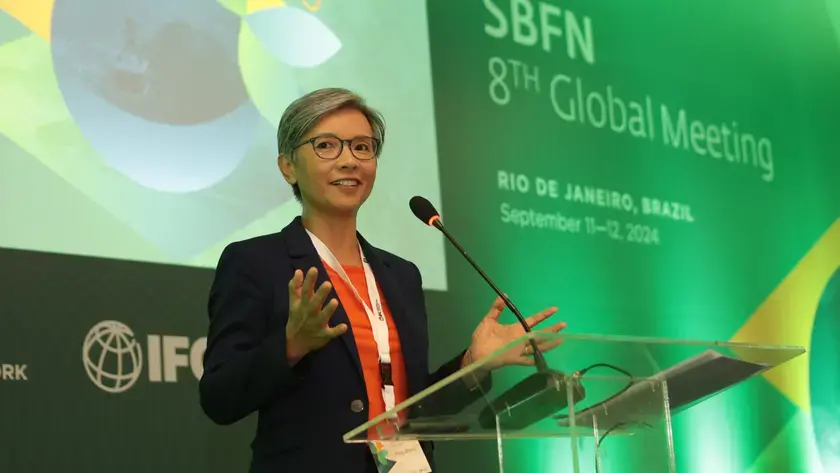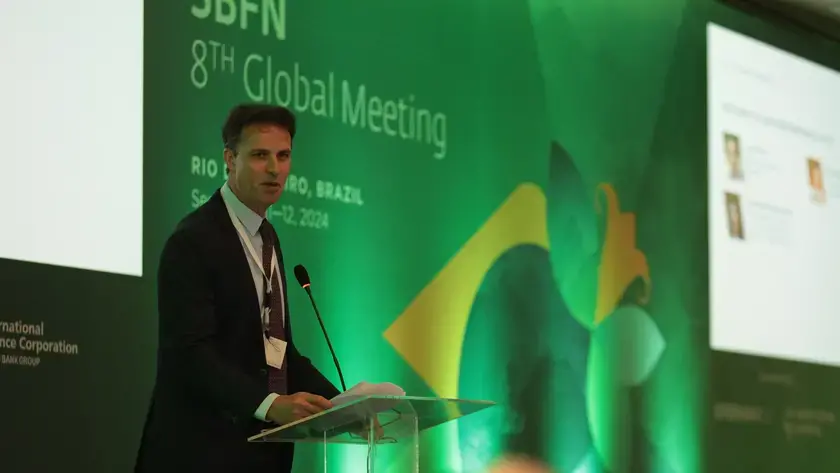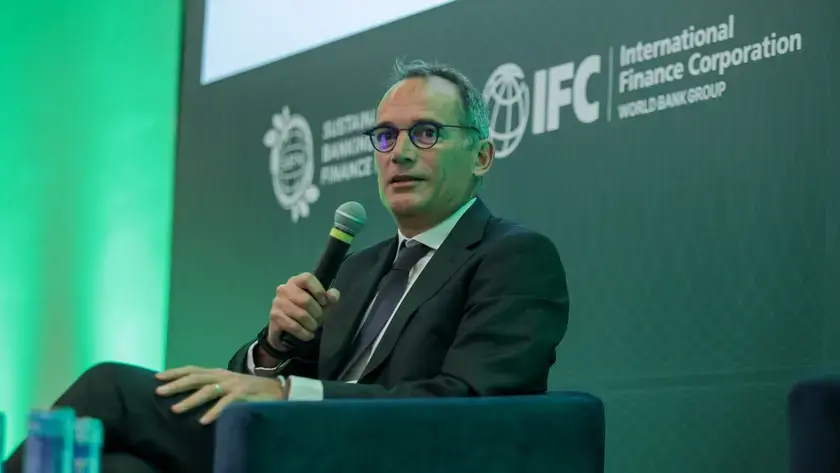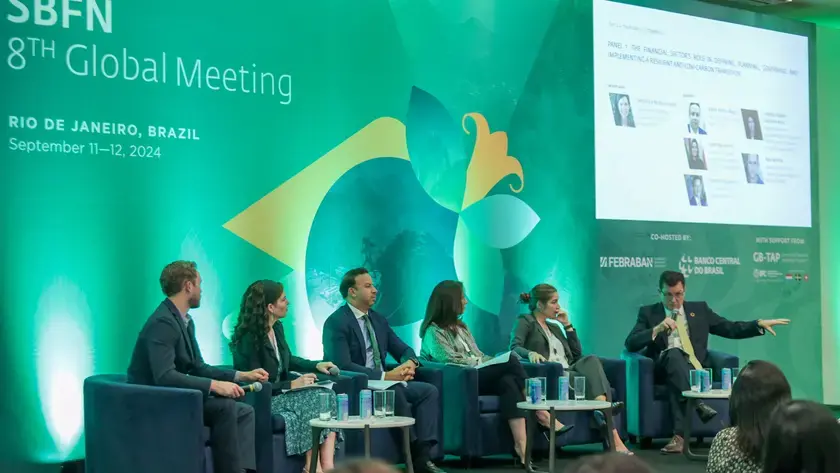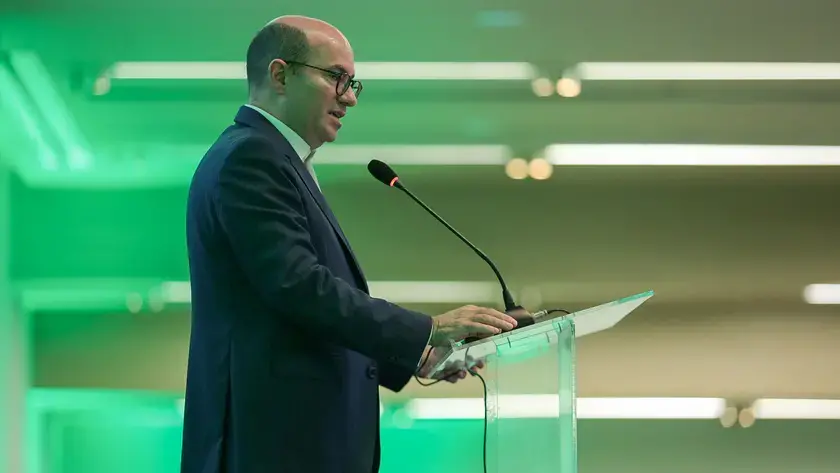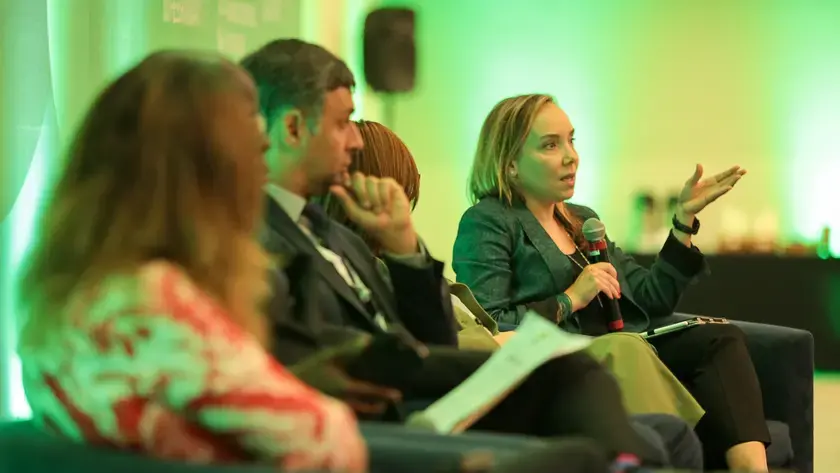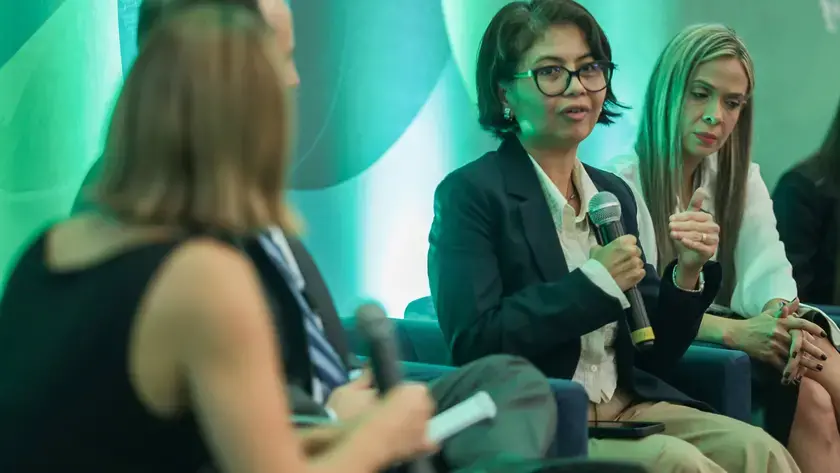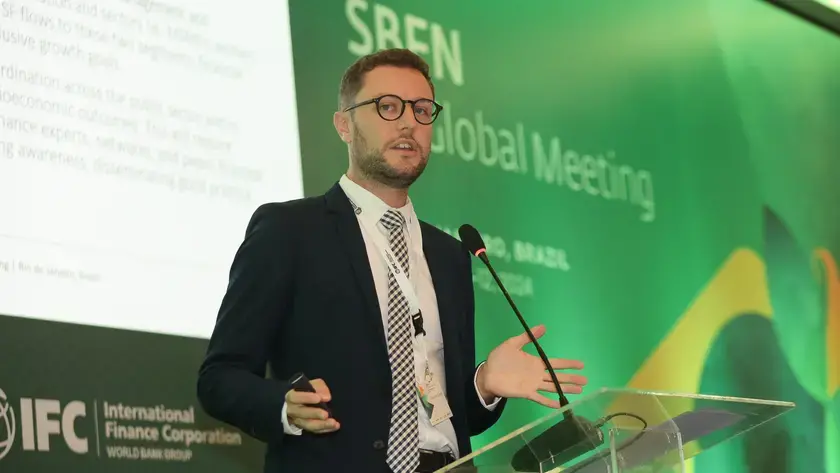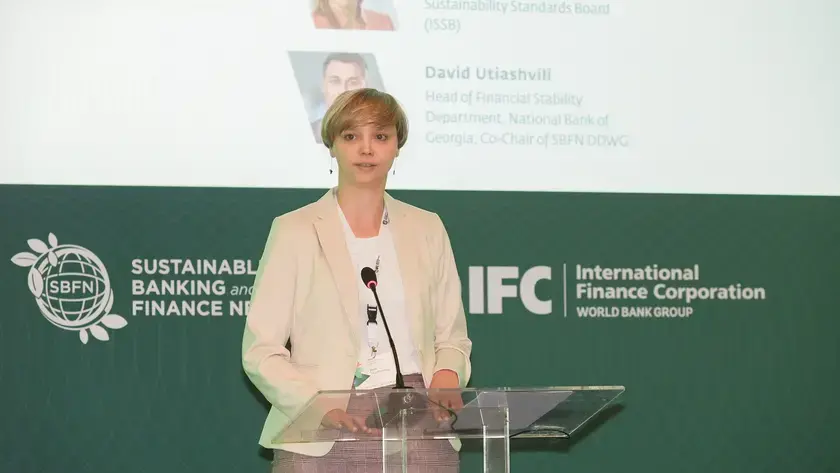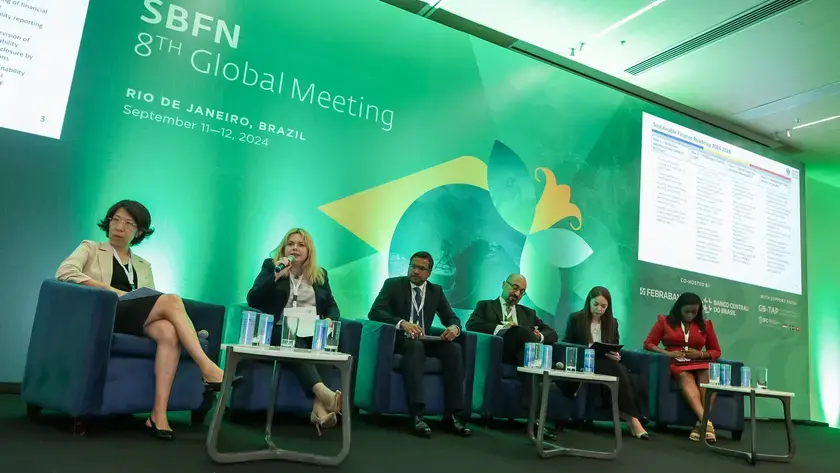Event Detail page
2024 Sustainable Banking Network 8th Global Meeting
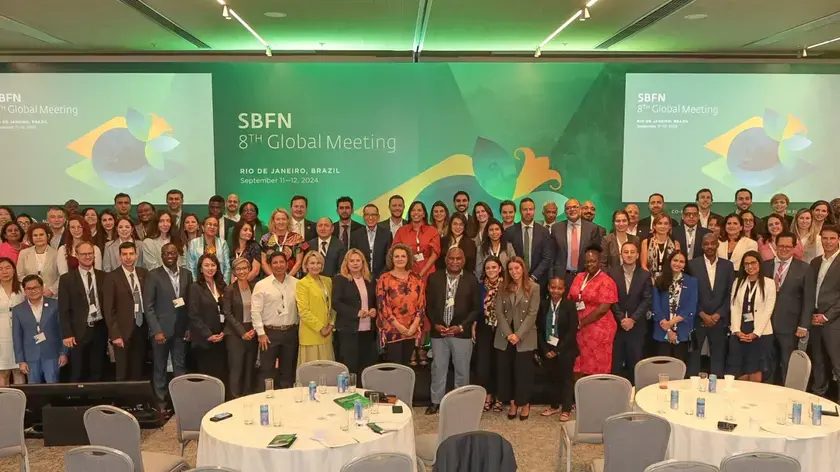
The SBFN 8th Global Meeting was held on September 11 – 12 in Rio de Janeiro, Brazil, on the margins of the G20 Sustainable Finance Working Group (SFWG) meeting, organized under Brazil’s Presidency. Co-hosted by IFC, the Central Bank of Brazil, and FEBRABAN (the Brazilian Federation of Banks), the event convened central bank governors, regulatory agency heads, and senior representatives from leading international networks, industry associations and standard-setting bodies to explore how Emerging Markets and Developing Economies (EMDEs) can influence the future of sustainable finance globally.
With over 140 speakers and participants from 60 countries, the 8th Global Meeting marked a significant milestone for EMDEs in the global dialogue on sustainable finance. It highlighted the critical role of EMDEs in driving the global transition to a resilient, low-carbon global economy. The meeting also served as a platform to announce key initiatives aimed at advancing sustainable finance, with discussions emphazising the need to build capacity and align standards to support resilient and inclusive growth across EMDEs.
Click here to read the press release.
Agenda
| Time | Content |
|---|---|
| 08:00 - 09:00 | Registration and Breakfast |
| 09:00 - 09:10 | Welcome by the SBFN Secretariat and Co-Hosts Justin Pooley, Manager for E&S Policy and Standards, IFC Isabela Maia, Head of Department, Sustainability and International Portfolio Investors Relations Unit, Central Bank of Brazil Amaury Oliva, Director of Sustainability, Brazilian Federation of Banks (FEBRABAN) |
| 09:10 - 09:30 | SBFN Priorities and Strategic Outlook This session focused on a discussion with members on SBFN’s strategic outlook and priorities, led by the SBFN Secretariat. Rong Zhang, SBFN Global Coordinator |
| 09:30 - 10:15 | Data and Disclosure Working Group (DDWG) This session was an opportunity for members to hear from the working group’s Co-chairs and experts on global trends in sustainability disclosure and served as a consultation session on the Draft SBFN Reporting and Disclosure Toolkit. Moderator: Jana Mudronova, Coordinator of DDWG, SBFN Secretariat David Utiashvili, Head of Financial Stability Department, National Bank of Georgia; Co-Chair of SBFN DDWG Elizabeth Seeger, Board Member, International Sustainability Standards Board (ISSB) Nomindari Enkhtur, CEO, Mongolia Sustainable Finance Association, SBFN Advisor |
| 10:15 - 10:45 | Coffee Break |
| 10:45 - 11:30 | Inclusive Sustainable Finance Task Force (ISF TF) The Co-chairs of the ISF Task Force shared their reflection on activities to date and their vision for future engagement. The session was an important milestone to receive feedback from members and experts on the Draft White Paper on Inclusive Sustainable Finance. Moderator: Vincent Darcy, Research and Working Groups Coordinator, SBFN Secretariat Ellen Joyce Suficiencia, Director, Sustainability Office, Bangko Sentral ng Pilipinas (BSP); Co-Chair of SBFN ISF TF Amaury Oliva, Director of Sustainability, Brazilian Federation of Banks (FEBRABAN); Co-Chair of SBFN ISF TF Samuel Tiriongo, Director of Research and Policy, Kenya Bankers Association; Co-Chair of SBFN ISF TF |
| 11:30 - 12:00 | Global Engagement Opportunities – Dialogue with G20 SFWG Co-Chair and Representative of CoP29 Presidency This session was an opportunity to share global trends and initiatives on sustainable finance by the G20 Sustainable Finance Working Group (SFWG), and CoP29. Moderator: Rong Zhang, SBFN Global Coordinator Wang Xin, Director General of Research Bureau, People’s Bank of China; Co-Chair of the G20 Sustainable Finance Working Group Shahin Mahmudzada, Executive Director of the Central Bank of the Republic of Azerbaijan (Representing COP29 Presidency) |
| 12:00 - 12:45 | Measurement Working Group (MWG): Enhancing Policy Impact Measurement The Co-chairs of the working group shared their reflections on the recent update of the SBFN Measurement Framework and the launch of the new SBFN Data Portal and 2024 Global Progress Brief, engaging members to discuss their vision for the future SBFN’s progress measurement work leveraging the Data Portal. The SBFN Secretariat shared upcoming plans for the Measurement Working Group, and introduced the member section of the SBFN Data Portal, enabling regular and easy updates by members to reflect country progress in a timely manner. Moderator: Vincent Darcy, Research and Working Groups Coordinator, SBFN Secretariat Vanessa Estefanía García Rocha, Head of the Sustainable Finance Group, Financial Superintendence of Colombia (SFC); Co-Chair of SBFN MWG |
| 12:45 - 14:00 | Lunch |
| 14:00 - 14:45 | Sustainable Finance Instruments Working Group (SFIWG) This session featured reflections on global trends and priorities for SBFN members by the working group’s Co-chairs, including ideas for future work for the working group, as well as a discussion on the SBFN Taxonomy Toolkit implementation to inform the global efforts on Taxonomy Harmonization. Moderator: Louise Gardiner, Climate Finance Practice Lead, IFC; SBFN Advisor Vukile Davidson, South African National Treasury; Co-Chair of SBFN SFIWG |
| 14:45 - 16:15 | Everything You Need to Know About Thematic and Sustainable Finance But Are Too Shy to Ask! This dynamic and interactive session focused on connecting dots and making sense of every aspect of the global sustainable finance market. IFC’s Green Bond Technical Assistance Program (GB-TAP) discussed the evolution of the sustainable bond market, the backstory behind each label, the interconnection of various market players, and the most invested types of green and social projects that are bringing life- changing impact to everyday people around the world. GB-TAP experts answered each and every question to empower practitioners with both the knowledge and inspiration to change culture, guide investment behavior, and shift the world to a greener and more sustainable future. Francisco Avendano, Senior Operations Officer, Climate Business, IFC Helena Dill, Sustainable and Climate Finance Specialist, IFC Irina Likhachova, Global Lead for Biodiversity Finance, IFC Yang Li, Sustainable Finance Market Specialist |
| 16:15 - 16:45 | Coffee Break |
| 16:45 - 17:45 | SBFN Members’ Regional Highlights This session featured short presentations of successful initiatives, achievements, and case studies by SBFN members from various regions across emerging markets. Moderator: Wei Yuan, SBFN Regional Coordinator, IFC Anca Dragu, Governor, National Bank of Moldova Walid Ali, Head, Sustainability Department, Central Bank of Egypt Ahmed Imad, Deputy Governor, Maldives Monetary Authority Natalia Valinoti, Head of Accounting Standards Division – Regulations, Central Bank of Paraguay Kieran St Omer, Senior Project Officer, Lead Greening the Financial System, ECCB |
| 17:45 - 18:00 | Closing Remarks |
| 19:00 - 21:00 | Welcome Dinner |
| Time | Content |
|---|---|
| 08:00 - 08:30 | Registration |
| 08:30 - 09:30 | Fireside Chat: Trends and Opportunities for EMDEs to Lead a Just Transition through Sustainable Finance This high-level conversation set the stage for this SBFN 8th Global Meeting by exploring how Emerging Markets and Developing Economies (EMDEs) can play an active role in the global dialogue toward a just transition through sustainable finance. The session highlighted key global trends, as well as the unique opportunities and challenges faced by EMDEs in mobilizing finance to support a shift towards resilient, low-carbon economies. Speakers discussed priorities for leveraging sustainable finance to address social and economic inequalities, fostering inclusive growth, and promoting environmental stewardship. Alfonso Garcia Mora, SBFN Chair and Vice President for Latin America & Caribbean and Europe, IFC Rachel Kyte, Professor of Practice in Climate Policy, Blavatnik School of Government, University of Oxford; Dean Emerita of The Fletcher School, Tufts University; co-chair of the Voluntary Carbon Markets Initiative; Director, The Private Infrastructure Development Group |
| 09:30 - 10:30 | Panel 1: The Financial Sector’s Role in Defining, Planning, Governing, and Implementing a Resilient and Low-Carbon Transition This panel discussion delved into the pivotal role that the financial sector plays in guiding and supporting the transition. Discussions focused on the responsibilities of financial sector regulators in setting and governing sustainability goals, as well as the importance of strategic planning and implementation through partnership between public and private sectors. Panelists, including senior representatives from international organizations, policymakers, and private sector, shared insights on the importance and challenges of transition planning. The session aimed to provide a comprehensive understanding of the financial sector’s role in leading the transition. Moderator: Veronica Nyhan-Jones, Global Head of Climate Capacity and Inclusion Accelerator, IFC Rami Aboul Naga, Deputy Governor, Central Bank of Egypt Gabriela Bertol, Senior Head Strategic Execution Sustainability & Net Zero, Santander Brazil Jamie Fergusson, Global Director of Climate Business, IFC Isabela Maia, Head of Department, Sustainability and International Portfolio Investors Relations Unit, Central Bank of Brazil Alex Michie, Managing Director, The Glasgow Financial Alliance for Net Zero (GFANZ) |
| 10:30 - 11:15 | Coffee Break |
| 11:15 - 12:15 | Panel 2: Advancing Harmonization of Sustainable Finance Taxonomies Collective actions and partnerships are needed to build a harmonized international approach for sustainable finance taxonomies. This panel discussed how to increase alignment and interoperability of taxonomies to achieve both global goals and national priorities and will highlight the needs of emerging markets and developing economies (EMDEs). The panel explored topics such as emerging best practices in taxonomy transparency and disclosure, enabling cross-border capital flows towards sustainable projects, and ensuring consistency in sustainable investment practices. Moderator: Louise Gardiner, Climate Finance Practice Lead, IFC;SBEN Advisor Dilrukshini WA, Assistant Governor, Central Bank of Sri Lanka Rustam Tahirov, Director of the Financial Sector Sustainable Development Department, Central Bank of Azerbaijan (Representing COP29 Presidency) Karina Velasquez, Executive Secretary, Central American Council of Superintendents of Banks, Insurance and Other Financial Institutions (CCSBSO) Zofia Wetmanska, Taxonomy Manager, Climate Bond Initiative Lucia Marin, Deputy Head of Unit, European Commission DG Financial Stability, Financial Services, and Capital Markets Union (Representing the International Platform on Sustainable Finance – IPSF) |
| 12:15 - 14:00 | Lunch |
| 14:00 - 15:00 | Panel 3: Adoption and Implementation Challenges of Sustainability Reporting Standards in EMDEs Experts examined the hurdles and opportunities associated with adopting and implementing sustainability reporting standards in EMDEs. The discussion covered the various frameworks and guidelines currently available, in particular the emergence of global standards such as the IFRS S1 and S2, the specific challenges EMDEs face in aligning with global standards, and the benefits of enhanced transparency and accountability to drive the transformation toward sustainability. Panelists included representatives from regulators, standard-setting bodies, and international organizations who shared their experiences and strategies, highlighted successful case studies, and provided practical advice for EMDESs striving to adopt and implement sustainability reporting and disclosure practices. Moderator: Svetlana Klimenko, Lead Climate Finance Specialist, World Bank David Utiashvili, Head of Financial Stability Department, National Bank of Georgia; Co-chair of the SBFN Data and Disclosure Working Group Joseph Akwasi Kuma, Head, Project Management Office, Bank of Ghana Vania Borgerth, Deputy Head of International Relations at the Brazilian Committee for Sustainability Pronouncements (CBPS) Elizabeth Seeger, Board Member, International Sustainability Standards Board (ISSB) |
| 15:00 - 15:30 | Coffee Break |
| 15:30 - 16:30 | Panel 4: Democratizing Sustainability: MSMEs and Supply Chain Finance This panel discussion addressed the critical role of Micro, Small, and Medium Enterprises (MSMEs) and supply chain finance to achieve sustainability goals. Panelists explored how democratizing access to sustainable finance can empower MSMEs to support environmental and social objectives. The session highlighted the challenges MSMEs face in accessing finance and the innovative solutions being developed to overcome these barriers. Experts shared their experiences and discuss strategies to enhance the inclusivity and effectiveness of sustainable finance initiatives. Moderator: Marcela Ponce, Sustainable Finance Advisory Services Lead, IFC; SBFN Coordinator for Latin America & the Caribbean Ellen Joyce Suficiencia, Director, Bangko Sentral ng Pilipinas (BSP); Co-Chair of SBFN Inclusive Sustainable Finance Task Force Alexandra Mendoza de Castro, CEO-Founder, Liquitech Alexander Sotiriou, Senior Financial Sector Specialist, CGAP Lucila de Silva, Deputy Director Risk Management & ESG, Mexican Banking Association |
| 16:30 - 16:45 | Closing Remarks: Manuel Reyes-Retana, Regional Director for Latin America, IFC |
| 18:30 - 21:00 | Cocktail Reception |
